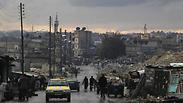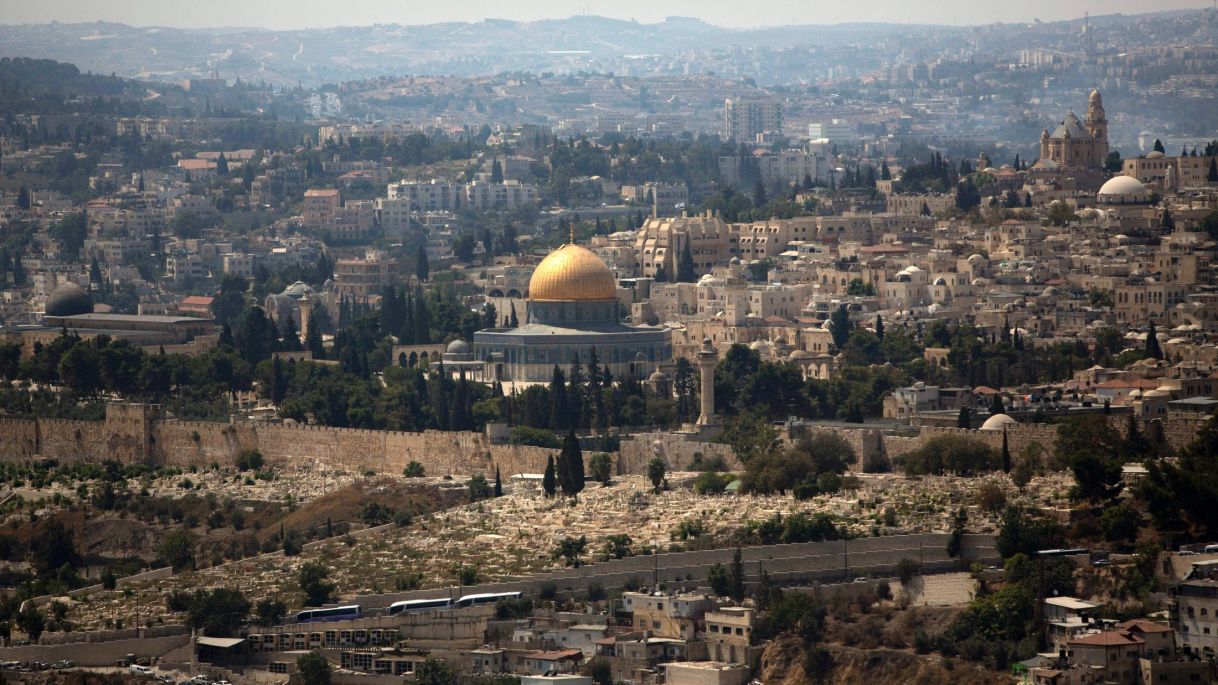
Aleppo (Photo: Reuters)
aleppo destruction
An Aleppan in Jerusalem, living within the “Zionist enemy”
After graduating Aleppo University, Elias worked at a plastic factory, but changed career paths, pursuing a life of contemplation as a monk after he attended a Franciscan march in Syria; today he lives in Jerusalem among Israelis and says he should not be the judge of the people he was told are his enemies.
Clad in a flowing, dun brown habit and sandals, he hitches rides from the top of the winding road, by Israel’s national military cemetery and Yad Vashem, the Holocaust museum, and asks to be taken to the center of the Ein Karem, the picturesque Jerusalem suburb. The views are nothing if not biblical: rolling hills, olive trees, terraces with rosemary, sage, and thyme, and nestled in the inclines like a palace out of a Disney movie, the shiny, golden onion-like domes that top the Russian Orthodox church.
Meet Elias (not his real name), a smiling 26-year-old Franciscan monk from Aleppo, who has spent the last two years in Jerusalem.
When he hops into the cars of Israelis, they invariably ask him where he’s from. “Some don’t say anything,” he reported, speaking with The Media Line from the café attached to the Church of Saint John the Baptist, his current home. Nearby, in the historical neighborhood housing the church, is Mary’s Spring, where the mother of Jesus is said to have stopped for water while walking from Nazareth to Bethlehem. “Some say in surprise ‘You’re Syrian!’ Some are afraid. Sometimes they say, ‘what a tragedy it is in Syria. We are praying for Syria’. Some say, ‘how interesting!’”
About the Israelis whom he was brought up to think of as “the Zionist enemy,” he now says “As Jesus said, who am I to judge?”
Elias was born and grew up in Aleppo. At eighteen, he considered turning towards a life of religious devotion but instead chose to study electronic technology. After studying for his degree at Aleppo University, he took a job as deputy director of a plastics factory.
But by the time he was 21, in 2011, the calling became too great to ignore.
In 2008, Elias took part in the Franciscan march in Syria, “and I saw how the brothers lived such simple lives, as a family. It appealed to me, it drew me to think about who God is, why I should be a Christian. Over time, I realized I wanted to live in this large family, in this simplicity, to live for the Lord.”
His family, Armenian Catholics, arrived in Aleppo as refugees from Turkish persecution sometime in the late 1800s. In 2011, as he was deciding to undertake a course of religious study in the Monastery of Qozhaya, Lebanon, also known as the Monastery of Saint Anthony the Great, the Arab Spring was licking at Syria’s borders, but life in Aleppo was still peaceful. His father, an architect, provided well for the family. His mother was an economist “but she never needed to work.” His older sister was studying architecture and his younger sister was still a schoolgirl. What he left behind was “a prosperous family in a peaceful city.”
About his decision to devote his life to the church, his mother said “you were a gift to me. If that’s what you want, it’s OK by me.” His father said “if that is your way, you decide.”
What unfolded next is a saga of biblical proportions. Elias had barely left Aleppo when war broke out and his mother, 45, was diagnosed with metastatic uterine cancer.
Aleppo today is demolished. Amid the ruins, the Russian army has recently set up a military base to mark its victory over the extremist Islamist militias that ruled Syria’s largest city.
The only member of his immediate family who remains in the city is his mother, who was buried there last year. When he sees images of the destruction, Elias says he feels “deep sadness, because it is as if all is destroyed, as if your own past is cancelled.”
As war tore his country apart and his mother’s illness spread throughout her body, “we started worrying about what to do,” he recalls. He spent 7 months in the Lebanese monastery before being transferred to Italy for more advanced study.
In Syria, medical care is free. His mother was able to avail herself of the services of the capital’s al Kindi hospital, then considered the top cancer treatment center in the Arab Middle East. In December 2013, a suicide bomber demolished the institution.
The last time Elias travelled to Syria was two weeks before his mother’s death, late in 2015. This is how he did it: From Jerusalem, he traveled to Jericho and took a bus across the Allenby/King Hussein Bridge into Jordan. From Jordan, he took another bus to Lebanon where he took a taxi from Beirut to Damascus. In Damascus, he got on another bus to Aleppo. The ride that once took 4 hours now takes 12.
When he returns, he presents his Syrian passport, that of an enemy nation, to the young Israeli recruits on duty at passport control.
He smiles. “Some say, ‘I’m happy to meet a Syrian’. Some of them know that monks are allowed to go in and out. Some are fearful.”
His oldest sister, an architect, now lives in Glasgow with her husband and baby. Through an international organization of young Christian students she met and married a Syrian who had already been working in Scotland for eight years. His younger sister’s studies (urban geometry) were interrupted. She, her husband, and Elias’ father now live in Poland, to which they were invited under a controversial Polish program extending visas to persecuted Christians. They got out in October 2015, one month after the young couple’s wedding.
“Many peoples on earth suffer instability, war and dispersal,” Elias says. “the Armenian people, the Jewish people and now the Syrian people. We’re neighbors.” An aunt, an uncle and his maternal grandmother remain in Aleppo. He communicates with his aunt via the miracle that is Facebook.
“They don’t know I’m here. They think I’m in Italy or Jordan, because of the political situation. I decided it is better for them… if anyone finds out I’m here, it could cause problems,” he says, understating the case considerably. “It could prevent me from entering Syria again.”
There are, he says, a sum total of four Syrian monks in Israel, three of them in the Jerusalem area.
“The first time I came here, it was the most beautiful thing,” he says, “to visit the holy sites. Bethlehem, Nazareth, the Galilee, even now, I love very much to go the Holy Sepulcher, where everything began.”
His encounter with a customs clerk at the border post was the first time in his life he laid eyes on an Israeli, though he had met a Jew in Italy, while studying.
Asked the big question—how can there be a God, if such suffering exists? —this is how Elias, a student of Christian philosophy, replies: “Saying God does not exist is the easiest thing. But understanding the true meaning of being free, understanding the real sense of what God is… that is the bigger challenge, but it brings you to the truth.”
“The Lord can enter into our hearts only when we open the door. But because we are free, we can also admit evil. From our freedom, the consequence can be evil, and that evil within one is not lived only by one individual, it is lived by everyone. Because of this I say, He can touch hearts and help people accept His will.”
Article written by Noga Tarnopolsky. Reprinted with the permission of The Media Line.












